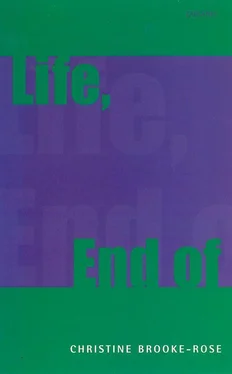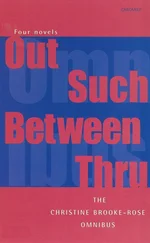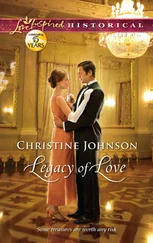Christine Brooke-Rose - Life, End of
Здесь есть возможность читать онлайн «Christine Brooke-Rose - Life, End of» весь текст электронной книги совершенно бесплатно (целиком полную версию без сокращений). В некоторых случаях можно слушать аудио, скачать через торрент в формате fb2 и присутствует краткое содержание. Год выпуска: 2012, ISBN: 2012, Издательство: Carcanet Press Ltd., Жанр: Современная проза, на английском языке. Описание произведения, (предисловие) а так же отзывы посетителей доступны на портале библиотеки ЛибКат.
- Название:Life, End of
- Автор:
- Издательство:Carcanet Press Ltd.
- Жанр:
- Год:2012
- ISBN:9781847775726
- Рейтинг книги:5 / 5. Голосов: 1
-
Избранное:Добавить в избранное
- Отзывы:
-
Ваша оценка:
- 100
- 1
- 2
- 3
- 4
- 5
Life, End of: краткое содержание, описание и аннотация
Предлагаем к чтению аннотацию, описание, краткое содержание или предисловие (зависит от того, что написал сам автор книги «Life, End of»). Если вы не нашли необходимую информацию о книге — напишите в комментариях, мы постараемся отыскать её.
by a master of experimental novels finds the author reflecting on her old age and its effects on her writing. As she reflects on her own career, her experiments with narrative, and on the narrative she writes here, she ultimately reasserts herself and accepts the life behind her.
Life, End of — читать онлайн бесплатно полную книгу (весь текст) целиком
Ниже представлен текст книги, разбитый по страницам. Система сохранения места последней прочитанной страницы, позволяет с удобством читать онлайн бесплатно книгу «Life, End of», без необходимости каждый раз заново искать на чём Вы остановились. Поставьте закладку, и сможете в любой момент перейти на страницу, на которой закончили чтение.
Интервал:
Закладка:
Hence the now familiar anger.
Possibly caused, not by O.P.s direct, but by O.P.s who happen to be caught in a loop bound to have unsaid commentaries, later forgotten anyway.
Lips on the screen move, overvoiced by summary or commentary that doesn’t fit the lips. The dancer disdances. Words de-scribe. Liberalism, once free trade and care, now just cruelty. And not in longer time but in a lifetime or much less. Is this all a neuronic telegame to keep the synapses active on eminently forgettable facts? Is this just another loop, with unnecessary justifying comment? Not really, for there is the usual blame-shouldering of passing time, if only of one shoulder. And neither shoulder matters a jot now. But deep down some vanity is also concerned here. And this loop, if it occurs, then produces several years of distancing trivia, more and more crushing for a handicapped person to take. Impossible in practice, as the handicap grows rapidly. Misunderstood both ends. Like the original banal misunderstanding with Tim, quickly repaired. How complex O.P.s are, not in fact O.P.s but loops. With not even embedded commentaries. Just as well.
1914, says a radio voice (and radio needs no looped images), brings in a radically new world, unrecognised at the time, even denied, yet confirmed by the entire century that follows. So now, we are once again entering a radically new world, and must learn to think it.
Unless of course we’re about to leave it.
In what way do you see it as radically new?
Chiefly three ways, but they can each lead to others. First, economics, a completely different method of trading. Second, cybernetics, unimaginable only a few decades ago. Third, genetics.
Damn, the bedpan.
Will these radical ruptures become like modern inventions, magical till they break down, then far worse than previous equipment, for which no one is now equipped? Here the truly poor, who carry water-jugs upon their heads for miles or elsewhere scrub their clothes on river-rocks, have a real advantage. Or will these ruptures turn out like earlier modernities, rejoining the long history of errors? Decybernisation? Degenetisation? But no, the correct euphemism now is post-, new and therefore better: post-human for instance, heard the other day. But that will at once be confused with posthumous, as of course it should be, human becoming humus.
Cybernetics too, may go wrong and into hibernetics one day, already uncontrollable. Now an Other Paradise. Rapidly becoming a World Wide Wank.
Out with the bedpan, without spilling if possible, and sitting back in the bed.
As for genetics, eighty is too old to think about it, except as a strong reason for exit. If only inventions of good possibilities could avoid the strong streak of human savagery, stupidity and greed. They never have so far. Good is not the opposite of evil, common sense is. What shocks in Axis of Evil speeches is not the proclamation of evil but the implicit or explicit proclamation of good. Good is on our side. So whatever we do is good. A bit like some scientific announcements.
Is that still the radio voice?
But isn’t the whole O.P. story the same? Who speaks?
Ah, the twentieth-century question. In fact, since you ask, nobody speaks.
Don’t be silly.
The Narrative Sentence, or Narrative Mode, is traditionally in the past tense third person, and early taken up by the historians.
So?
It’s a historian’s sentence. That happened, this way. The historian’s sentence is impersonal. Nobody speaks, it’s speakerless, the sentences seem to write themselves. Yet it rings omniscient. But it’s limited to the past tense third person. The moment a historian needs to address the reader, he passes into Speech Mode. In the present tense, for instance, or other tenses, with pronouns all allowed in Speech Mode.
As in Fiction you mean?
Yes. Where there’s a slow rise of dialogue, which is Speech Mode. Early novelists use little dialogue, they stick to the Narrative Mode and use indirect speech, he said that , for anything said by a character, but at first that’s rare, as it is in epic, which can also introduce long tirades with He spake , followed by direct speech. That becomes the later he said . But the bulk is in narrative mode, past tense, for events, places, times, actions, plans and so forth.
How can they express plans in the past tense?
That’s the point. Narrative sentences and speech mode sentences have a different grammmar. Narrative mode is limited to the past tense and its linked tenses when necessary. For instance a future in narrative mode needs to change will to would . In indirect speech he said that he would . And when that developed into free indirect speech, called f.i.d. by the experts, to represent the thoughts of a character, this would and all that goes with it is taken over, simply without he thought that . But that’s a tricky topic, in a way bracketed off here. Above all, time and place words are different in narrative mode. Tomorrow and yesterday have to be the following day, two years ago becomes two years earlier , with minor variations of course, here becomes there, this becomes that and so on. And of course no I/you .
Is that what I do, you mean? Are readers aware of this?
No you don’t, not here anyway. But everyone does it since the beginning of narrative. And as it poses problems many have tried to change it. Still, since most stories are in narrative mode except for dialogue, most readers take it for granted without formulating it.
Do authors know it?
Of course. All first attempts at writing a story, even at school, follow those rules, without knowing it. Authors say they dislike literary theory but these are ordinary narrative rules, which they follow by instinct, and may later try to play with.
But how did all these differences happen?
How do any differences happen? The interesting thing is that it’s so regular, so rule-ridden. But let’s talk of something else, this would take too long.
Okay but what did you mean by bracketing off, for free-whatever-it-was?
Oh hell, I’m doing it again. The details of narrative art, which interest no one, are my Ariadne threads. I can’t create, but I absorbed them and analysed them with enthusiasm all the way through. Enthusiasm is life. End of, please forgive me.
Nonsense, I asked you. Please go on, free what? Summarise.
I’ll try. Indirect and direct speech are classical categories for what gives the character’s unspoken words. Indirect speech is part of narrative mode, developed out of indirect speech, which belongs to narrative mode. Same grammar, at least at first, third person past and relevant belongers like would for will . Direct speech is of course speech mode, the very words of the character. But free indirect is a modern development, well, first signs seventeenth century. By the time of Jane Austen it’s very wittily and briefly used. By Flaubert it’s become page-long thoughts, all the way to Virginia Woolf. Joyce parodies it in Ulysses . Soon it’s misused, and in the end collapses. It’s the fragile aspect of the impersonal narrative sentence.
Example?
I said no, stop leading me on. Let’s just say it’s used carelessly, as in some Science Fiction, making characters speak, in direct speech dialogue, or think, in free indirect thought, elementary information they’d never use, and really addresssed to the reader.
Such as?
Read more, instead of writing, you’ll start noticing it.
Christ! Who speaks?
Not Christ, I’m coming to that. You asked for the history.
And you said it would be brief. And simple.
This is school level. A long time ago. I can’t make it briefer. And simple it should be, it’s talked and read by you and me. Okay I’ll come to the point. By the twentieth century this is all highly developed, a healthy mixture of narrative and speech mode. But many try to get away from this distant yet omnisicent and interfering author. Who’s not always clear anyway, sometimes he’s like those people who sit and talk with a stretched or folded hand over their mouth. Some tried novels wholly in dialogue, too close to theatre without its advantages. But all novels have lots more dialogue than they used to, which allows all tenses and all pronouns.
Читать дальшеИнтервал:
Закладка:
Похожие книги на «Life, End of»
Представляем Вашему вниманию похожие книги на «Life, End of» списком для выбора. Мы отобрали схожую по названию и смыслу литературу в надежде предоставить читателям больше вариантов отыскать новые, интересные, ещё непрочитанные произведения.
Обсуждение, отзывы о книге «Life, End of» и просто собственные мнения читателей. Оставьте ваши комментарии, напишите, что Вы думаете о произведении, его смысле или главных героях. Укажите что конкретно понравилось, а что нет, и почему Вы так считаете.












